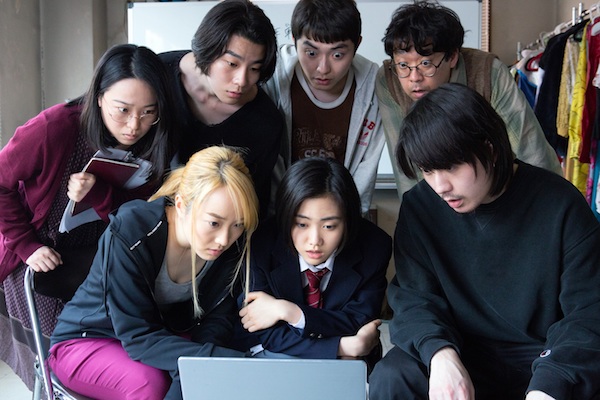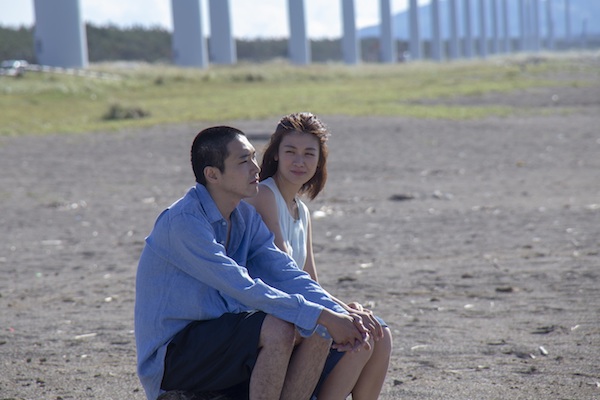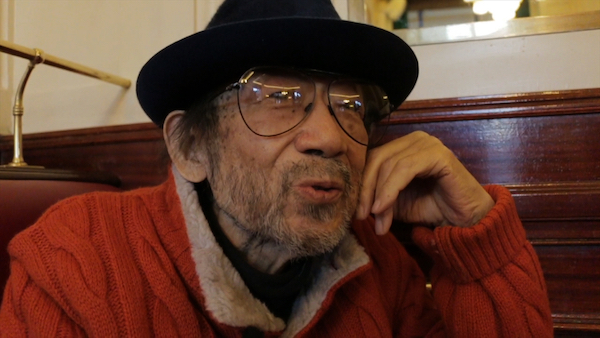The 14th annual Japan Cuts Festival of New Japanese Film opens in an online edition starting today, July 17. The largest festival devoted to Japanese film in North America, Japan Cuts has built a tradition of providing viewers New Yorkers the best possible look into Japanese cinema, from experimental shorts to repertory classic, mainstream hits, and cutting edge independent films.

Thanks to the pandemic, Japan Cuts joins other film festivals in switching to an online format. On the one hand viewers will miss the opportunity to share movies with a full audience, the thrill of seeing filmmakers in person, and the chance juxtapositions unique to festivals.
However, Japan Cuts, working with Festival Scope and Shift72, is now able to open its programming to everyone in the US. In addition to screenings, the festival offers Q&A sessions and discussion panels. It’s a compromise the world must face, hopefully one that will resolve in the future.
What makes Japan Cuts so lively, so much fun, is its idiosyncratic choice of movies. Most film festivals lean toward obvious indie films. Japan Cuts embraces the whole spectrum of moving images. Here you’ll find not only grim personal dramas like Beyond the Night, but mainstream blockbusters like Fukushima 50, a blow-by-blow account of the Fukushima Daiichi Nuclear Power Plant disaster on March 11, 2011, as well as experimental shorts and documentaries.
The earthquake and resulting tsunami in 3/11 casts a pall over other titles in the festival. Take Voices in the Wind, directed by Nobuhiro Suwa. It’s centered around a telephone booth in Otsuchi where some 30,000 people “speak” to the departed. This is Suwa’s first film in Japan in 18 years, and it’s a quiet, deeply moving account of coping with loss.

At the other end of the 3/11 spectrum, Kenji and Naoko never recovered from the disruption the disaster caused. Ken lost his job in a printing plant, and is now a low-energy slacker living in his dead mother’s house. His former lover Naoko seems to be doing better: she’s marrying an officer in the Self-Defense Forces, and just bought a rural house with a view of the ocean. But in Haruhiko Arai’s It Feels So Good, the two former lovers grapple with their feelings for each other by surrendering to sexual desire.
Known primarily as a screenwriter, Arai is a beguiling filmmaker with uncanny insights into his characters. Their interactions with the world—buying a new TV, having ramen for lunch—are shown with documentary precision that borders on deadpan comedy. Arai keeps the camera pulled back from Naoko and Kenji until their passion erupts, then details their physical fury with unabashed interest. As the film unfolds, it’s clear that neither one knows how deeply they have been wounded by events around them.
The characters in Mrs. Noisy (directed by Chihiro Amano) and My Sweet Grappa Remedies (directed by Akiko Ohku) couldn’t be farther apart. Maki succumbs to rage against her neighbor in Mrs. Noisy, all captured on a viral video. In My Sweet Grappa Remedies, Yoshiko Kawashima has worked in publishing for decades when change suddenly enters her life. These are characters who aren’t fully aware of how discontented they are, both with themselves and with a world that has been altered beyond their control.
Director Naoki Murahashi’s Extro reminded me a bit of The Actor, the closing film in the 2016 edition of Japan Cuts. The Actor followed Ken Yasuda as he tried to make a living as an extra in samurai and gangster films, a storyline that let director Satoko Yokohama dissect the Japanese cinema industry with humor and affection. In Extro, Murahashi uses a faux documentary format to profile movie extras, in particular an elderly performer who idolizes Steve McQueen.

The late director Nobuhiko Obayashi, who died in April, had a cameo in Extro. Japan Cuts honors Obayashi by including his mammoth final work, Labyrinth of Cinema, a three-hour anti-war epic. The documentary Seijo Story — 60 Years of Making Films examines Obayashi’s creative and personal partnership with his wife and producer Kyoko. Their daughter Chigumi Obayashi will participate in a panel discussion about her father, one of the several free events offered by the festival.
This year Japan Cuts has instituted the Obayashi Prize, which will be awarded to the winner of the Next Generation section. It’s designed for early-career directors of independent films. Titles and directors in competition this year: Beyond the Night, Natsuki Nakagawa; Kontora, Anshul Chauhan; Life: Untitled, Kana Yamada; The Murders of Oiso, Takuya Misawa; My Identity, Sae Suzuki; Roar, Ryo Katayama; and Sacrifice, Taku Tsuboi.
The festival’s repertory section focuses on Tora-san, the beloved comic character who appeared 50 comedies stretching back to Tora-san, Our Beloved Tramp in 1969. That film and two other fan favorites are featured in this year’s Japan Cuts, as well as the final in the series, Tora-san, Wish You Were Here.
Japan Cuts favorite Kazuo Hara is represented by the four-hour-plus documentary Reiwa Uprising. Hara’s 1987 film The Emperor’s Naked Army Marches On is one of the landmarks in Japanese documentaries, and his chilling Sennan Asbestos Disaster was a standout in the 2018 festival.
The festival’s opening night film is Special Actors, directed by Shinichiro Ueda. The centerpiece is Fukushima 50, which is also the opportunity to honor its two leads, Koichi Sato and Ken Watanabe. They will receive this year’s Cut Above Award, an annual award recognizing outstanding achievement in Japanese cinema. The two stars will appear virtually.
Honestly, no one is happy with an online film festival. But one big advantage to this year’s Japan Cuts is that its entire lineup of titles is available from today through July 30. Being able to see them on your own schedule makes a big difference.
Over the years, Japan Cuts has been the best survey of Japanese cinema available to New Yorkers. Now everyone in the US can participate in one of the few indispensable film events of the year.
Japan Cuts 2020 is organized by K. F. Watanabe, Amber Noé, and Joel Neville Anderson. Virtual ticket prices range from $2–$7, with discounted ticket bundle offers available. For complete information visit japancuts.japansociety.org. Watch the YouTube trailer here: https://www.youtube.com/user/JapanSocietyNYC/videos


